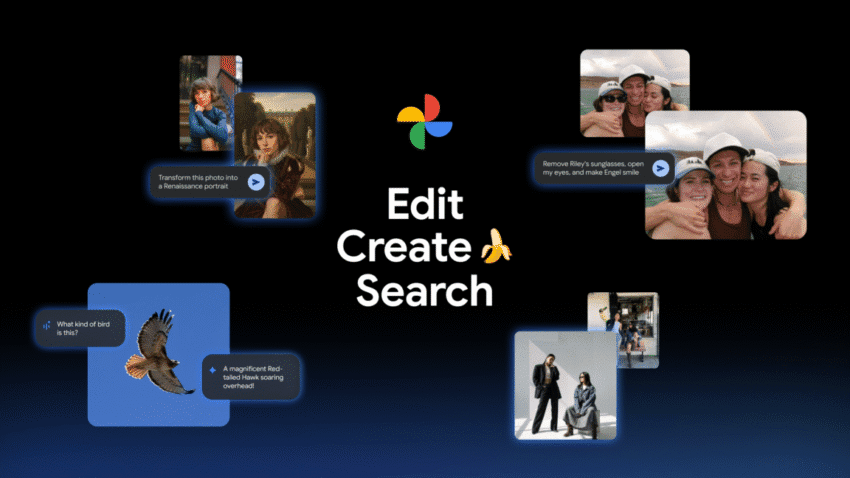
google announces even more ai in photos Google has unveiled new generative AI features in its Photos app, leveraging its innovative Nano Banana image-editing model.
google announces even more ai in photos
Introduction to Nano Banana
Google’s Nano Banana model has been a topic of discussion since its initial unbranded demo earlier this year. Designed to enhance image editing capabilities, Nano Banana allows users to input an image and specify desired edits, making the process more intuitive and user-friendly. The model’s introduction marks a significant advancement in Google’s ongoing efforts to integrate artificial intelligence into its suite of applications.
Features of Nano Banana in Google Photos
The rollout of Nano Banana in Google Photos is not limited to Android devices; it is also available for iOS users, broadening its accessibility. This cross-platform functionality underscores Google’s commitment to providing a seamless experience for all users, regardless of their device preference.
Enhanced Editing Capabilities
One of the standout features of Nano Banana is its integration into the “Help Me Edit” function of the Photos app. Previously, this feature utilized an older model that did not deliver satisfactory results. With the introduction of Nano Banana, users can expect a marked improvement in the quality of edits, even if the results are still described as “AI slop.” The term “AI slop” refers to the sometimes unpredictable nature of AI-generated content, which can yield varying results based on the complexity of the request.
Conversational Editing
The updated Help Me Edit feature allows for a more conversational approach to image editing. Users can now input specific instructions that include names of individuals in their photos. For instance, a user might type, “Remove Riley’s sunglasses,” and Nano Banana will recognize Riley in the image, provided that the user has saved that person’s name in their private face groups. This capability not only streamlines the editing process but also enhances personalization, allowing for more tailored edits.
Implications of AI in Image Editing
The integration of AI into image editing tools like Google Photos has far-reaching implications for both casual users and professional photographers. As AI technology continues to evolve, it is likely to reshape how images are edited and shared across social media platforms and other digital spaces.
Accessibility for Casual Users
For everyday users, the introduction of AI-powered editing tools simplifies the process of enhancing photos. Many individuals may lack the technical skills or software knowledge to perform complex edits manually. With Nano Banana, users can achieve professional-looking results with minimal effort. This democratization of image editing could lead to an increase in user engagement with the Photos app, as more people feel empowered to create visually appealing content.
Impact on Professional Photography
On the other hand, the rise of AI in image editing presents challenges for professional photographers. As AI tools become more sophisticated, they may reduce the demand for traditional editing services. Photographers may need to adapt their skill sets to remain competitive, focusing on aspects of photography that AI cannot replicate, such as creative vision and storytelling. Additionally, the proliferation of AI-generated images raises questions about authenticity and originality in photography.
Stakeholder Reactions
The announcement of Nano Banana’s integration into Google Photos has elicited a range of reactions from stakeholders in the tech and photography communities.
Consumer Enthusiasm
Many consumers have expressed excitement about the new features, particularly the ability to make specific edits using names. This functionality aligns with the growing trend of personalized technology, where users seek tools that cater to their individual needs. The promise of improved editing quality has also resonated with users who have previously been frustrated by the limitations of older models.
Professional Concerns
Conversely, some professional photographers have voiced concerns about the implications of AI in their field. While they acknowledge the potential benefits of AI tools for casual users, there is apprehension about the impact on job security and the value of human expertise in photography. The fear is that as AI becomes more integrated into the editing process, the unique skills and artistry of professional photographers may be undervalued.
Future Developments in AI Image Editing
As Google continues to refine its AI capabilities, the future of image editing looks promising yet uncertain. The introduction of Nano Banana is just one step in a larger trend toward AI-driven creativity. Other tech companies are also exploring similar technologies, indicating that the competition in this space will likely intensify.
Potential for Further Innovation
Future developments may include even more advanced features that allow for greater customization and creativity in image editing. For example, users might be able to specify not only what edits they want but also the style or artistic influence they wish to apply to their images. This could open up new avenues for creative expression, allowing users to experiment with different aesthetics without needing extensive knowledge of editing software.
Ethical Considerations
As AI tools become more prevalent, ethical considerations will also come to the forefront. Issues related to privacy, data security, and the potential for misuse of AI-generated content will need to be addressed. Google has emphasized the importance of user privacy in its AI initiatives, but ongoing scrutiny from consumers and regulatory bodies will be essential to ensure that these technologies are used responsibly.
Conclusion
The integration of the Nano Banana model into Google Photos represents a significant advancement in the realm of AI-driven image editing. With enhanced features like conversational editing and improved quality, users can expect a more intuitive and personalized experience. However, the implications of this technology extend beyond convenience, raising important questions about the future of photography and the role of human creativity in an increasingly automated world. As Google and other tech companies continue to innovate, the landscape of image editing will undoubtedly evolve, presenting both opportunities and challenges for users and professionals alike.
Source: Original report
Was this helpful?
Last Modified: November 11, 2025 at 10:36 pm
1 views














